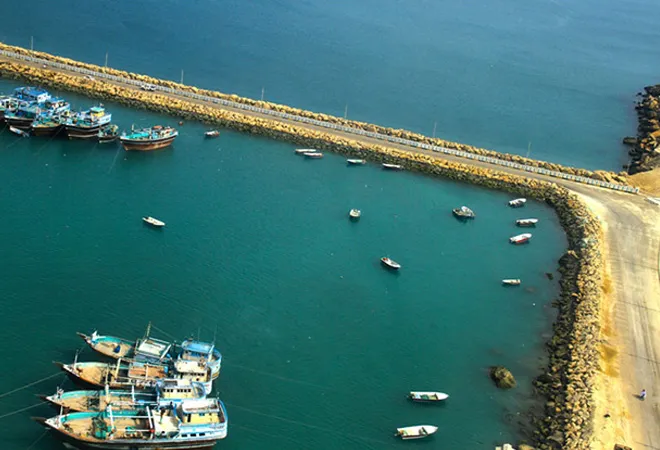
The United States’ decision to pull out of the JCPOA and fear of new sanctions on Iran threatens the development and operation of the Chabahar port. The Tripartite Agreement signed by Iran, India and Afghanistan in May 2016 envisioned the development of Chabahar as a transit hub that would help connect landlocked Afghanistan to the Indian Ocean. The port’s development is expected to be a game-changer for the region, particularly Tehran and Kabul.
The initial trilateral agreement to develop Chabahar to facilitate regional trade and transit was signed over a decade ago. It was only after India’s construction of the road from the border town of Zaranj to the Delaram in Afghanistan and the signing of the JCPOA that the Chabahar port project took off. According to the agreements, India has to develop, equip and operate two berths at Chabahar, with a capital investment of USD 85.2 million and a revenue expenditure of USD 22.5 million on a 10 year lease. India has also extended a USD 150 million line of credit for the project. <1> In October 2017, the first consignment of one million tonnes of wheat was shipped to Afghanistan from India via Chabahar. Two months later, the first phase of the Shahid Behesti port (out of the five phases planned) was inaugurated. The port’s capacity of 8.5 million tonnes is equivalent to that of all northern ports in the country, and its ability to dock large container ships makes Chabahar Iran’s only deep-water port. <2>
The biggest beneficiary of the port project has been Afghanistan as the development of the port is the landlocked country’s first big step towards expanding connectivity. India’s plan to construct highways, railway links and other transportation routes in Afghanistan and in Iran, will help Kabul bypass Pakistan and give New Delhi strategic access to the war-torn country. Without any access to the ocean and shipping routes, Afghanistan has remained dependent on Pakistan’s Karachi port for its exports. However, mutual mistrust, border closures, fluctuating custom tariffs and political tensions between the two countries have drastically affected trade and transit. Pakistan has successfully used its advantage of being Afghanistan’s transit route as a bargaining chip to show Kabul the cost of superseding Pakistan. <3>
The biggest beneficiary of the port project has been Afghanistan as the development of the port is the landlocked country’s first big step towards expanding connectivity. India’s plan to construct highways, railway links and other transportation routes in Afghanistan and in Iran, will help Kabul bypass Pakistan and give New Delhi strategic access to the war-torn country.
Through Chabahar, however, Afghanistan gains immediate access to international trade and shipping routes. The inauguration of the port in 2017 has allowed Iran to overtake Pakistan as Afghanistan’s biggest trade partner, with USD 1.98 billion worth of goods being exported to the country. Iran has also provided special incentives to Afghan investors at Chabahar; 165 out of the 500 companies licensed to operate in Chabahar are Afghan. In addition, Tehran offers an 80 percent discount in export tariffs and a 75 percent discount on import duties to Afghan traders using Chabahar. <4>
In addition, provisions under the Countering America’s Adversaries Through Sanctions Act (CAATSA), which targets countries doing business with Iran, North Korea and Russia, will also affect India’s energy cooperation with Iran. Iran is India’s third largest oil supplier, with New Delhi importing crude oil worth USD 11.1 billion between 2017-18. <5> While Secretary of State Mike Pompeo has urged Congress to provide India with the necessary waiver so that its sanctions on Russia do not affect India’s defence relationship with the country, it is unlikely that a similar waiver will be granted for Iran. CAATSA is congressionally mandated and it will be difficult for India to get a waiver unlike in the case of pre-JCPOA US sanctions on Iran. In addition to CAATSA, fresh unilateral sanctions on Iran will affect progress on other connectivity projects such as the International North South Corridor. <6>
The imposition of fresh sanctions on Iran jeopardises the Chabahar project. Not only do sanctions deter countries and companies from doing business with Tehran, even the threat of sanctions being imposed on financial institutions facilitating business in the country, will result in a pullback in financing for the port. The United States’ desire to ‘punish’ Iran for its nuclear programme and support for extremist groups in the region, therefore conflicts with Washington’s desire for stability in Afghanistan. The Chabahar port has a direct benefit for Afghanistan as it reduces Kabul’s dependence on Pakistan roads and transportation networks for its exports. In order for Afghanistan to develop its own economy and reduce its dependence on foreign (read: United States) aid, it is crucial that it finds sustainable and reliable trade routes. Through the Chabahar port, Afghanistan stands to gain new transit and transportations corridors, through which it connects not only with countries in west Asia, but with India and other countries in South Asia as well. The development and use of the port, therefore, directly benefits the US as it helps in strengthening the weak Afghan economy.
The United States’ desire to ‘punish’ Iran for its nuclear programme and support for extremist groups in the region, therefore conflicts with Washington’s desire for stability in Afghanistan.
The US withdrawal from JCPOA also impacts the relationship Iran shares with its eastern neighbour, Pakistan. The future of the Iran-Pakistan Gas Pipeline project, or the Gas Sales Purchase Agreement, that was signed in 2009 remains uncertain. While Iran has completed the construction of the pipeline, Pakistan has not fulfilled its end of the deal of buying Iranian oil. Given Pakistan’s close relationship with Iranian rivals, Saudi Arabia and the UAE, Islamabad has been under pressure to not buy Tehran oil. Under the agreement, Pakistan is liable to pay a fine of USD 1 million per day should it be unable to take gas supplies for Iran. While Iran has offered Turkmenistan the same deal as Pakistan, it remains uncertain that whether or not there are sanctions, Pakistan will be able to buy oil from its neighbour without upsetting its allies.
Although the Chabahar port has been touted as a rival to Pakistan’s Gwadar port that is being backed by China, the two ports’ ‘strategic rivalry’ exists only because of the players (China and India) supporting the port. Iran has invited Pakistan and China to use Chabahar and has expressed its interest in joining the China-Pakistan-Economic Corridor (CPEC) as well. Given India’s overtures to the United States, and the bureaucratic inefficiencies and delays in finishing Chabahar, chances are high that Iran may embrace CPEC; this will be a major setback for India. A halt to the development of Chabahar will help boost Gwadar’s status as an international trading hub.
This essay originally appeared in ORF Special Report Beyond JCPOA: Examining the consequences of US withdrawal.
References
<1> Moushumi Das Gupta, “Interim operations in Chabahar port to start by next week”, Hindustan Times, 8 June 2018.
<2> “Iran Biggest Trade Partner of Afghanistan in 2017-18”, Financial Tribune, 9 April 2018.
<3> Mirwais Parsa, “Why Pakistan and Afghanistan Should Keep Trade Away from Politics”, Fair Observer, 10 November 2017.
<4> Zarmina Mohammadi, “Iran Offers Discounts to Chabahar Traders”, Tolo News, 24 August 2017.
<5> Ronak D. Desai, “With US Withdrawal From the Iran Deal, Expect India-Iran Oil Trade to Take a Hit”, Forbes, 11 June 2018.
<6> Uma Purushothaman, “Will Sanctions Again Imperil India-US Relations?”, ORF, 12 June 2018.
The views expressed above belong to the author(s). ORF research and analyses now available on Telegram! Click here to access our curated content — blogs, longforms and interviews.




 PREV
PREV


